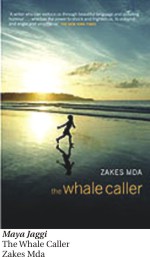|
Book Review
One Man and his Whale
The playwright and novelist Zakes Mda, an exile of some 30 years who took part in that debate, is among the most acclaimed exponents of a new artistic freedom. His fiction has a beguiling lyricism and humour, revelling in the beauty of aloe-covered mountains or Cape marine life. Yet The Whale Caller, his fifth and perhaps most imaginatively freewheeling novel, also captures malaise in the "new South Africa", where "rainbow people sport rainbow hairstyles" but walk as though without a past, without rancour, "in a precarious dream that may explode into a nightmare without much warning".
 The setting is the Western Cape coastal resort of Hermanus, whose cliffs are a magnet for a burgeoning tourist tribe of whale watchers. While the real town is famed for its whale crier, who trumpets the mammals' appearance, Mda's Whale Caller uses his kelp horn to summon not the tourists but the migrating southern right whales. The craggily handsome loner, in his 60s with a "big bald head" and "rich silvery beard", lives in a two-roomed bungalow (his "Wendy house") on a staple of macaroni cheese. Abandoning his blue dungarees for a tuxedo, he communes in erotic harmony with his ideal love, the she-whale Sharisha, who lobtails and breaches as "his horn ejaculates sounds". When stalked and wooed by Saluni, the village drunk in red stilettos, the Whale Caller is reluctant to give up his behemoth. But as Saluni sees it, it is the "eternal triangle: man, woman and whale ... The fish must go". The setting is the Western Cape coastal resort of Hermanus, whose cliffs are a magnet for a burgeoning tourist tribe of whale watchers. While the real town is famed for its whale crier, who trumpets the mammals' appearance, Mda's Whale Caller uses his kelp horn to summon not the tourists but the migrating southern right whales. The craggily handsome loner, in his 60s with a "big bald head" and "rich silvery beard", lives in a two-roomed bungalow (his "Wendy house") on a staple of macaroni cheese. Abandoning his blue dungarees for a tuxedo, he communes in erotic harmony with his ideal love, the she-whale Sharisha, who lobtails and breaches as "his horn ejaculates sounds". When stalked and wooed by Saluni, the village drunk in red stilettos, the Whale Caller is reluctant to give up his behemoth. But as Saluni sees it, it is the "eternal triangle: man, woman and whale ... The fish must go".
The novel charts this bizarre triangle with quirky humour and a keen delineation of character, its tragicomic passion between marginal misfits reminiscent of Athol Fugard's Boesman and Lena. Rearranging the Whale Caller's life as she arranges flowers in his bungalow, Saluni teaches him to partake of conspicuous consumption despite his meagre pension by "gourmandising" with his eyes in supermarkets. The "love child" Saluni is a "transgressor of all that he holds sacred: moderation, quiet dignity ... frugality". She was "made to be recklessly happy. He was made to be cautious. And to be patient."
As the Whale Caller sneaks off to his unseen confessor Mr Yodd, who dwells in a grotto with rock rabbits, Saluni is drawn to the Bored Twins, angelic yet sinister seven-year-old sisters, whose singing promotes heady euphoria but whose sadistic naughtiness is in part down to their parents' incessant labour in the vineyards. Flights of fantasy are continually brought down to earth. Lunga Tubu, a 12-year-old from Zwelihle township who dreams of being Pavarotti, sings arias for his supper amid the "floral shirts and funereal faces" of tourists chomping on boerewors rolls.
Sustained lyricism makes the occasional resort to overt political comment more jarring, but there are also subtle allusions and insights on truth and reconciliation or insatiable expectations. Saluni seizes an ice-cream from the Whale Caller "as if it is something he has always owed her. Not even a 'thank you'." A "battle-scarred soldier nursing old wounds", she has an overweening sense of entitlement. Though her stolid lover admires this appetite for happiness, he is wary of its voraciousness. That the so-called Euphoriant children prove capable of violence as well as beauty sounds another note of warning.
A wise and seductive tale of love and jealousy, The Whale Caller also hints at the precarious euphoria of a society in transition. Its apocalyptic ending, involving an eclipse, a blinding, a tsunami and a beached whale, might suggest that the author shares his Whale Caller's leaning towards patience and caution.
Source: The Gaurdian Copyright
(R) thedailystar.net 2005 |
